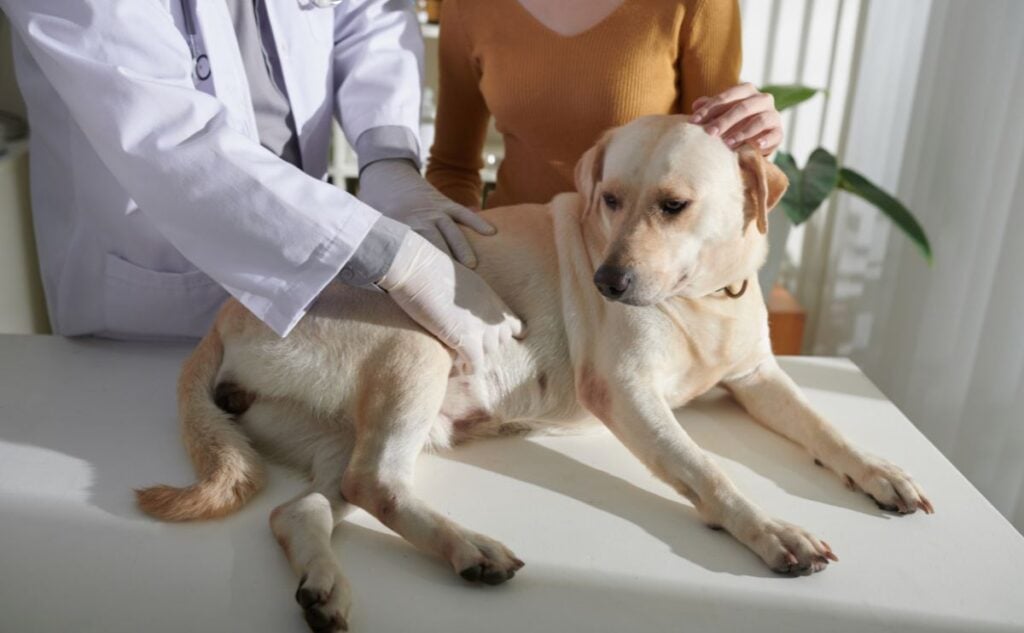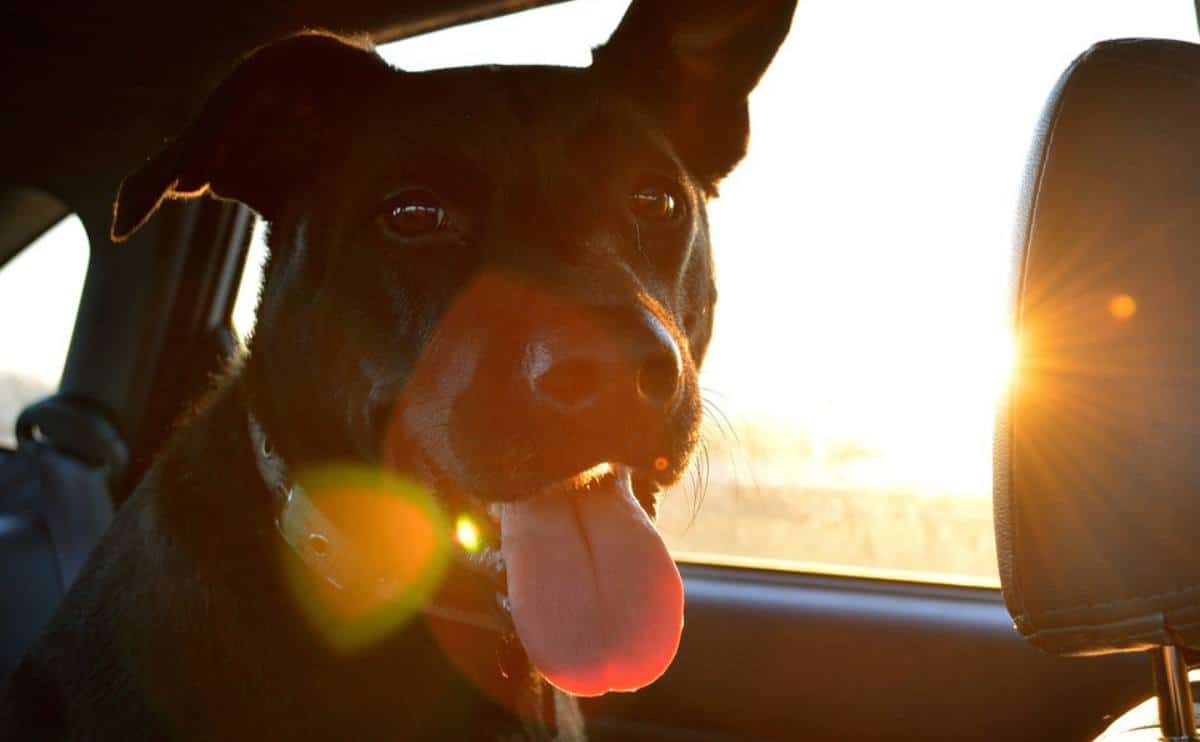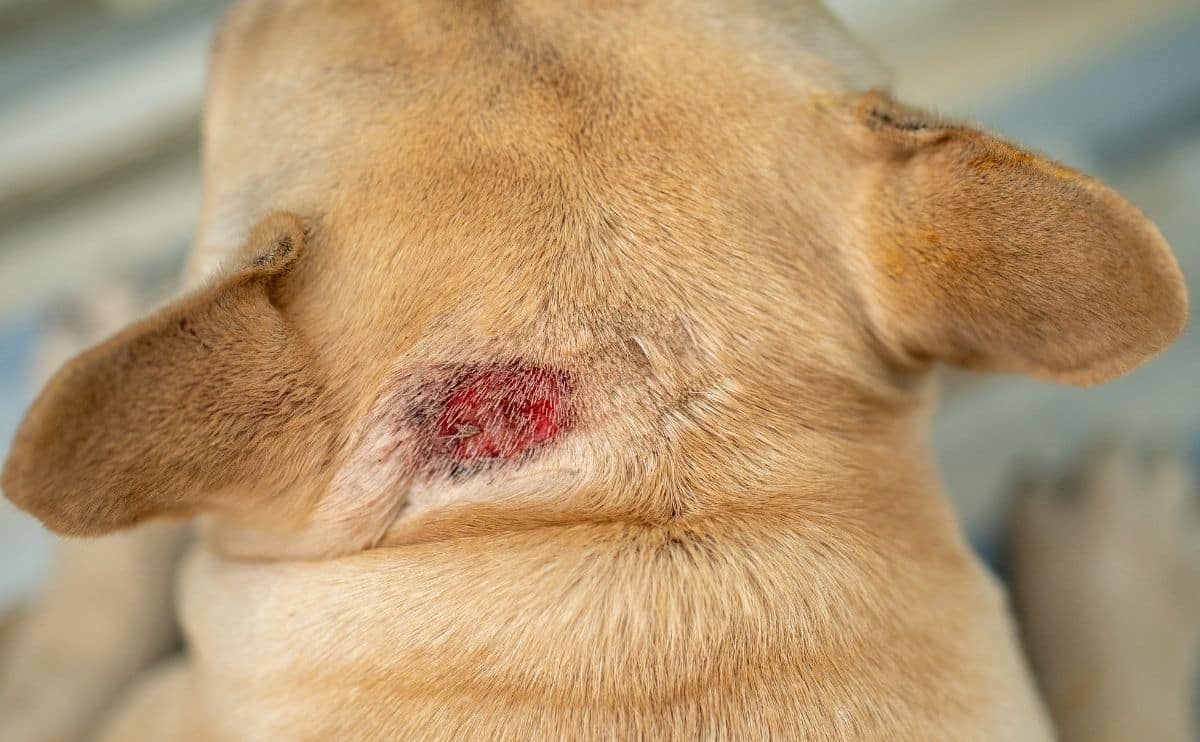IBD In Dogs: Inflammatory Bowel Disease In Dogs, Symptoms, Causes, Treatment & More
When you purchase through links on our site, we may earn a commission. Here’s how it works.

The symptoms of inflammatory bowel disease (IBD) are similar to those of irritable bowel syndrome (IBS), but they are different conditions that need separate treatment. I explore what IBD in dogs is, the difference between IBD and IBS, and the symptoms, causes, and treatments you need to know about. I’ll also look at the recovery for dogs with IBD, our personal experience with this condition, and much more.
Table of Contents
What Is IBD In Dogs?
IBD stands for inflammatory bowel disease, even though IBD is technically a syndrome rather than a disease. IBD used to be called spastic colon, and some vets might still use the term spastic colon in dogs when referring to IBD. I spoke to veterinarian Dr. Hannah Godfrey, and here’s what she has to say about IBD in dogs.
Inflammatory bowel disease, or IBD, in dogs is really common. In fact, it’s the most common cause of chronic (persistent) vomiting and diarrhea in dogs. Unfortunately, IBD is idiopathic, which is the scientific term for a condition where the underlying cause is undetermined. Because there’s no known cause, the only way to officially diagnose IBD is to rule out all of the other causes of vomiting and diarrhea, which can be time-consuming.
– Dr. Hannah Godfrey, BVetMed MRCVS, Veterinarian
Watch this informative video by Dan, a veterinarian who answers the question, “Can a dog have IBD?”
IBD Vs IBS In Dogs
If you’re wondering what the difference between IBD and IBS is, you’re not alone. Inflammatory bowel disease and irritable bowel syndrome in dogs have similar symptoms and are often confused. However, they are two different ailments that require separate treatments. According to the American Kennel Club (AKC), “The term IBS is rarely used in veterinary medicine. IBD, on the other hand, is a common condition in dogs.” Unlike IBD, IBS in dogs is commonly linked to stress and anxiety, which is why treating irritable bowel syndrome in dogs often starts with anti-anxiety treatment.
Symptoms Of IBD In Dogs
IBD occurs when the lining of the intestine becomes inflamed, which causes an allergic-type response in the intestinal tract. Over time, the inflamed cells prevent normal digestion and absorption of nutrients, which can lead to secondary health concerns and malnutrition. Because of this, IBD in puppies can be very serious. The symptoms of IBD in dogs can include:
- Lack of appetite
- Weight loss
- Lethargy
- Noisy tummy
- Flatulence
- Vomiting
- Diarrhea
- Bloody stools
- Constipation
- Fever
- Abdominal distension
- Swelling of the extremities
- Blood clots
3 Causes Of IBD In Dogs
The causes of IBD in dogs aren’t clear, and this is why it is such a frustrating disease. However, there are three main theories as to what causes or contributes to IBD.
1. Genetics
Scientists believe that there could be a genetic link like there is in humans with IBD. Research shows that certain dog breeds are more at risk of chronic digestive issues in general. Although any dog breed can experience IBD, the breeds more at risk of GI problems include:
- Alaskan Malamutes
- Basenji
- Boxers
- Doberman Pinschers
- French Bulldogs
- German Shepherds
- Mastiffs
- Norwegian Lundehunds
- Soft-Coated Wheaten Terriers
- Yorkshire Terriers
2. Imbalanced Gut Health
Like in humans, there is a strong correlation between IBD and gut health imbalances. This could be down to genetics, but it can also be a result of the use of antibiotics. Antibiotics kill both good and bad bacteria, and IBD studies in dogs show that those with IBD have different microbiome levels compared to those free from gut issues.
We have an informative guide on antibiotics for dogs, including which ones are best suited for specific conditions and other important information. Although you should work with your vet, it’s good to be informed should your dog need antibiotic treatment.
3. Immune System
It is a well-known fact that poor immunity correlates to poor gut health. If the immune system doesn’t respond as it should when pathogens enter the intestinal walls, the intestines can become inflamed. Several health conditions, such as allergies, infections, cancer, and autoimmune diseases, such as hypothyroidism, can all lower immunity.
Feeding your dog a well-balanced, high-quality diet can support your dog’s immune system. With your vet’s go-ahead, consider adding vitamin supplements to your dog’s diet.
How Vets Diagnose IBD In Dogs

As IBD is idiopathic, vets begin diagnosis of IBD by ruling out other possible causes or diseases. It is also a chronic condition that must last for more than three weeks. If the vet cannot identify other causes, IBD may be the diagnosis. Here are some of the typical IBD testing a vet might conduct:
- Physical Exam. A vet will want to see your dog, feel their abdomen to check their organs, and take their vitals.
- Urine & Blood Tests. A complete blood cell count and urinalysis can identify their protein levels, vitamin levels, and organ function.
- Fecal Exam. A veterinarian will test the dog’s stool for parasites and other issues, such as blood in their stools.
- X-Ray. An X-ray is a non-invasive way to identify any blockages causing the symptoms.
- Ultrasound. An abdominal ultrasound is another non-invasive way to identify intestinal inflammation and examine the GI tract.
- Biopsy. Sometimes, in severe cases or when dogs don’t respond to treatment, a biopsy might be needed to confirm the diagnosis through exploratory surgery or an endoscopy.
How Pet Insurance Can Help
Some owners find the process of IBD diagnosis daunting, and it can also be an expensive route. But it’s important to start treatment right away as soon as you notice the symptoms of IBD in dogs. Otherwise, it can worsen quickly, leading to other health conditions, malnutrition, and pain. An insurance plan can help families manage the financial costs associated with emergency health care and maintenance. Our pet insurance expert shares her pet insurance reviews to offer you the best options and help you find a company that suits your needs and pup. We also provide a free quote widget below to pull prices from our top companies.
How To Treat IBD In Dogs: 3 Ways
As the underlying causes of IBD are often unknown, treating irritable bowel disease in dogs varies. Usually, vets try several treatments, starting with the most commonly successful. Here’s what Dr Hannah Godfrey has to say about the treatment of IBD in dogs:
While there’s no cure for IBD, diet changes and treatment with immunosuppressants, like steroids, can help improve symptoms, and many dogs can be managed long-term without medication on a specific hypoallergenic diet.
– Dr. Hannah Godfrey BVetMed MRCVS, Veterinarian
1. Diet Change
First, most vets suggest a change in diet, often to a novel or a hydrolyzed diet. A novel diet has a single protein source the dog hasn’t tried before, usually an animal protein like rabbit, duck, or venison. A hydrolyzed diet is where the protein has already been broken down into smaller parts so that the body doesn’t recognize it as a protein and doesn’t have to work so hard to break it down. For a diet trial to work, it must be fed exclusively without other food or treats for at least two to three months minimum.
We also have a guide on our favorite limited-ingredient diets that could be useful as part of your pup’s treatment.
2. Medication
If the diet change doesn’t work, your vet might prescribe medications. These could include antibiotics, immunosuppressives, steroids, and more. Most medications aim to reduce the inflammation in the intestine to help it recover and work as it should.
3. Supplements
Supplements have also been shown to help improve the symptoms of dogs with IBD. Vets might recommend adding probiotics to help populate their gut with good bacteria or vitamin B12 to their diet. Sometimes, a dog might need to attend a veterinarian clinic for occasional B12 injections to ward off IBD flare-ups.
Recovery & Management Of IBD In Dogs
The recovery and management of dogs with IBD varies greatly. Some dogs might experience IBD once in their lifetime, whereas others might require lifelong treatment to manage it. Some dogs might only need a specific diet or medication for a few months or as and when symptoms arise. Others might need to remain on the new diet and/or medication indefinitely to manage symptoms. Working with your vet and sticking to their treatment plan is essential. Do not give up or assume something isn’t working, and stop treatment. IBD is a progressive disease that needs treatment because it can be debilitating and eventually lead to premature death.
Our First-Hand Experience With Canine IBD
When my dog Leo stopped eating his food and quickly started losing weight, my mind immediately thought the worst. I took him to the vet, and they were worried as well. But after many general tests came back normal, she said, “I know it might sound strange, but your dog could have IBD.” We’ve all heard of IBS/IBD in humans, but this was the first time I heard it even being possible in dogs.
It’s not easy to diagnose or treat. But after numerous blood tests, X-rays, ultrasounds, and rounds of antibiotics, there didn’t seem to be any other explanation for my dog’s symptoms. So my vet did one more blood test and sent it off to Texas A&M, one of the only U.S. labs that tests for this condition. Sure enough, the results showed low folate levels that indicated malabsorption in the gut for my Leo.
There was only one other test they could perform to confirm the condition, and that was an actual biopsy of his intestines. We were already treating Leo with steroids, and he seemed to be on the mend, so I decided not to do the biopsy. Still, my vet felt confident that after ruling out all the other possibilities, Leo was probably dealing with IBD.
I’m happy to say that 3 months down the line, Leo is much happier and back to his healthy weight. He loves his daily walks, and although he’s on a very low dose of daily steroids for maintaining his healthy gut, I’m hoping we can eventually get him off the medication. However, my vet warned me that IBD is a chronic condition, and we always have to closely monitor his diet and weight to make sure to recognize if he has a relapse. I’m just happy Leo is feeling better, and we’ll do what we need to keep him as healthy as we can throughout the rest of his life.
– Nicole Stebbins, Mom To Leo & Writer For Canine Journal
Frequently Asked Questions

We know that many of our readers still have questions about IBD in dogs. If you have a question not listed below, please ask us in the comments, and we’ll get back to you with an answer.
How Common Is IBD In Dogs?
IBD is the most common cause of chronic vomiting and diarrhea in dogs. And because it is idiopathic and a lengthy process to diagnose, it’s probably more common than realized. IBD in puppies is rare, although it can occur. Can dogs have IBS? Yes, but it is much rarer than IBD in dogs.
What If A Dog With IBD Isn’t Getting Better?
It can take several weeks before you see an improvement in your dog’s IBD symptoms. If your dog isn’t showing any signs of improvement, you need to go back to your veterinarian for further analysis or a different treatment. There is no cure for IBD in dogs, and treatment is usually a trial-and-error system.
Can IBD In Dogs Be Fatal?
IBD in dogs is not usually life-threatening, and most dogs can live normal lives with the proper treatment. However, it is a progressive syndrome that can worsen without treatment, as well as lead to secondary health problems. Because of this, it can be fatal in dogs if undiagnosed.
Consider Changing Your Dog’s Diet To Fresh
If your vet recommends changing your dog’s diet and it is suitable, why not consider opting for a fresh dog diet? Fresh dog food is among the highest quality options, and The Farmer’s Dog is one of our top recommendations. Fresh food deliveries can be at your doorstep at the convenience of a button, too, so you get to spend more time with Fido and less time at the pet store. If you need help deciding what diet to feed Fido, check out our all-encompassing guide on the best dog foods, depending on various factors.
Does your dog have inflammatory bowel disease? Perhaps you are going through an IBD diagnosis? Wherever your pup is on their IBD journey, we’d love to hear your experiences in our comments section below.
Why Trust Canine Journal?
Emma is a mom to two rescue dogs, Bonkers and Chips. She has decades of experience as a dog owner, walker, sitter, and volunteer at her local rescue shelters. Emma is passionate about sharing her knowledge and research with other dog owners to help them and their pups live harmoniously. She works with a dedicated team at Canine Journal to continue being a go-to resource for all things dog.


